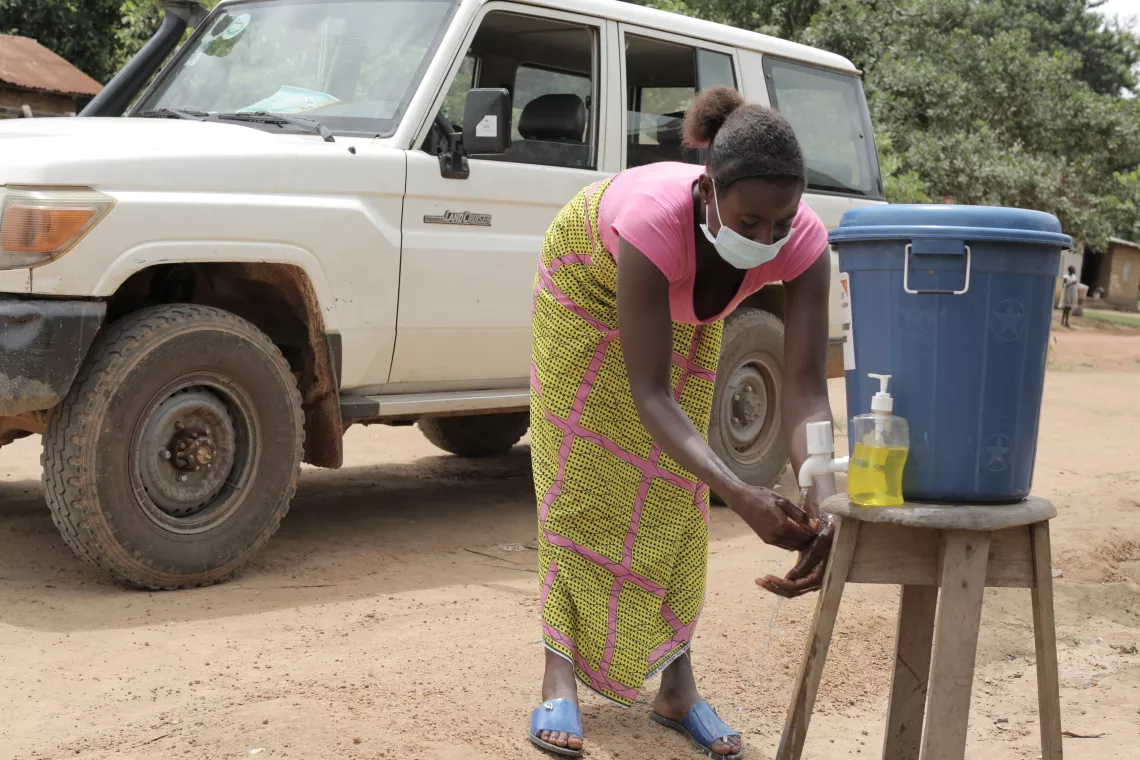The tireless work of Community Health Workers to support mothers and children’s health
An effort to improve health service delivery to rural communities in Sierra Leone

Kono, Sierra Leone - At Weima village, Fiama chiefdom in Kono district, Community Health Worker, Kadiatu Karim has dedicated her afternoon to visiting young mother, Isata Marah, whose baby is just one week old. Kadiatu has kept a close eye on 19-year-old Isata’s health and wellbeing from the time of her pregnancy and delivery. Today she is happy to be sitting on the porch of her house, celebrating the safe arrival of Isata’s baby.
“This is Isata’s first baby. She is still very young herself and is also staying with her husband. I have therefore been supporting her since pregnancy, ensuring that she attends Ante Natal Classes and informing her of the benefits of delivering at the health facility and not at home. I am glad that Isata has followed my advice and that she now has a healthy baby,” says Kadiatu, who has committed to supporting Isata to balance the different roles she faces at such a young age.
Since 2017, Kadiatu has been an asset to families in Weima village in Kono district. As a Community Health Worker, Kadiatu is charged with the responsibility of ensuring that children under the age of five do not die or become ill from preventable diseases, including malaria, measles, or diarrhea. She knows that every new mother, especially adolescent mothers, deserves support in taking care of their newborn, and therefore makes the regular home visits to check on how both mother and baby are faring.
Of particular concern is the high number of young mothers, with 31 per cent of women age 20-24 years giving birth before the age of 18 years. According to the World Health Organization (WHO), early childbearing increases risks for newborns as well as for the young mothers. Without proper guidance and support, young mothers might also find themselves with another pregnancy, presenting further health risks.

“Today I will give Issata some tips on how to hold her baby during breastfeeding and I will also remind her of the importance of ensuring that the baby is exclusively breastfed for six months and vaccinated according to the vaccination schedule,” says Kadiatu, as she shares a synopsis of some of the critical lessons every new mother should know.
The deployment of Community Health Workers into villages such as Weima, has become a critical strategy to support Sierra Leone’s progress towards attaining the health-related targets of the Sustainable Development Goals. Across Sierra Leone, health outcomes for mothers and babies are still worrying, with 717 deaths per 100,000 live births among mothers, and infant mortality rate at 122 deaths per 1,000 live births.
With thanks to the generous contribution from the Korean Committee for UNICEF, UNICEF in collaboration with the International Rescue Committee (IRC), has supported the Kono District Health Management Team (DHMT) to deploy 975 Community Health Workers across Kono District, who have been trained to become an intimate and skilled support base for adolescent mothers.

From Kadiatu’s experience over the years, when adolescent mothers are given the right support and guidance, they are better able to care for their babies and themselves. In addition to the tips on how to look after the baby, adolescent mothers are also connected to birth control services and provided with information on how to protect themselves from HIV and gender-based violence.
Community Health Workers have become particularly important at this unsettling time when cases of COVID-19 are rising across the country. With a lot of misinformation floating around, Kadiatu remains one of the trusted people in Weima helping young mothers with information on baby care during this period of a health emergency.
Protecting her own health and safety has also been critical for Kadiatu. She is aware that to maintain essential health services in her community and to remain healthy for her own two infant children, she must regularly wash her hands with soap and wear her mask properly, especially when visiting families.




